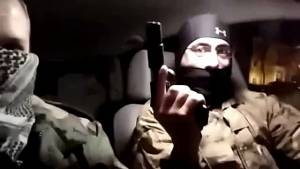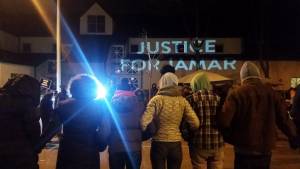Why Climate Justice connects us all to the Black Lives Matter activists shot by white supremacists in Minneapolis.
Last night, Andy Pearson of MN350 was with the Black Lives Matter protesters at the #4thPrecinctShutDown when shots were fired. The encampment was demanding accountability (eg: names of the officers, and the release of police videotape – the names have since been released, and the video tape remains a demand) after the killing of unarmed black man Jamar Clark at the hands of police.
Andy heard the shots and saw people running. 5 protestors were shot by white supremacists. The injured protesters were taken to the hospital and one underwent overnight surgery. Andy noted that people were not just running away from the shots – many were running towards them to help. The next day he challenged all of us, “If you’ve ever wondered what you’d do if you were alive during the civil rights era, now’s the time to find out.”

Photo of two white supremacists, one carrying a pistol, who came to #4thPrecinctShutDown. Photo: @BlackLivesMLPS
It should be no secret that we are in a heightened level of racist backlash in this country — and around the world. In the last two weeks alone, we have witnessed the terrorist attacks in Paris, Beirut, and Mali, and the violent and xenophobic backlash in its wake, often emerging as fear and hate crimes against Syrian refugees.
We have footage of people at a recent Trump rally beating and choking a Black man — all while calling him the n-word and “monkey” for saying “Black Lives Matter.” The man was arrested while the attackers went free. Trump later bragged about the violence saying “he deserved to get roughed up” and after his supporters beat a homeless Latino man, he called them “enthusiastic.”
These are only a few of the many forms of insidious threats against communities of color, particularly Black people, that persist in our justice system, that create inequities in access to clean air and water, and that feed a cycle of division and prejudice.
Addressing climate change means replacing the old unequal systems with a new world; it requires us to fight racism and climate change hand-in-hand. Our movement gets weaker when we talk about climate change only through the lens of saving the environment. It gets stronger when we can talk fluidly about how climate change is impacting our people, is about racial and economic justice, is about reconnecting to our spiritual roots, is about the daily problems people face. For us, fighting climate change is about fighting against a system that devalues the Earth, treats all natural resources as commodities, devalues individuals, and refuses to see each person as sacred.
That is why we join MN350 in their declaration:
“MN350 organizes for climate justice: We recognize and seek to address the deep connections between the injustices that perpetuate racism, inequality, and runaway climate change. Today, the leaders, staff and activists who work with MN350 send their thoughts and prayers to the family of Jamar Clark and those who were the victims of white supremacist violence last night and too many times before. #Justice4Jamar”
If you have been “on the fence” on this issue — depending on where you and your family are coming from in experiencing and confronting racism, whether by lack of action or feeling disconnected from it — now is the time to get off the fence. This Thursday, as many of us gather to give thanks with our families, is a great opportunity for all of us to help our relatives understand why climate justice work is work for peace and racial justice. Wherever you are, really talk about why racial justice matters — talk it out with others, even those who disagree with you.
Looking for resources to take a stand right now? Today Chris Crass published a free e-book called Towards the “Other America”: Anti-Racist Resources for White People Taking Action for Black Lives Matter. 350 staffer Daniel Hunter has also released free copies of the organizing guide: Building a Movement Against the New Jim Crow.
Also, consider making a donation to Black Lives Matter Minneapolis as a way of expressing gratitude this Thursday.
We’ll close with more encouragement for boldness from Andy: “I wasn’t alive in the 1960s and so don’t know what that time in our history felt like. When white terrorists can hang out at a police precinct, shoot a bunch of black people, and walk away into the night, we have a deep and systemic problem. I know that what happened last night is wrong, profoundly wrong, and makes me think on how much work there still is to do. ”
With love and justice,
– Everette R. H. Thompson, Daniel Hunter, Joshua Kahn Russell, and Yong Jung Cho, for 350.org
